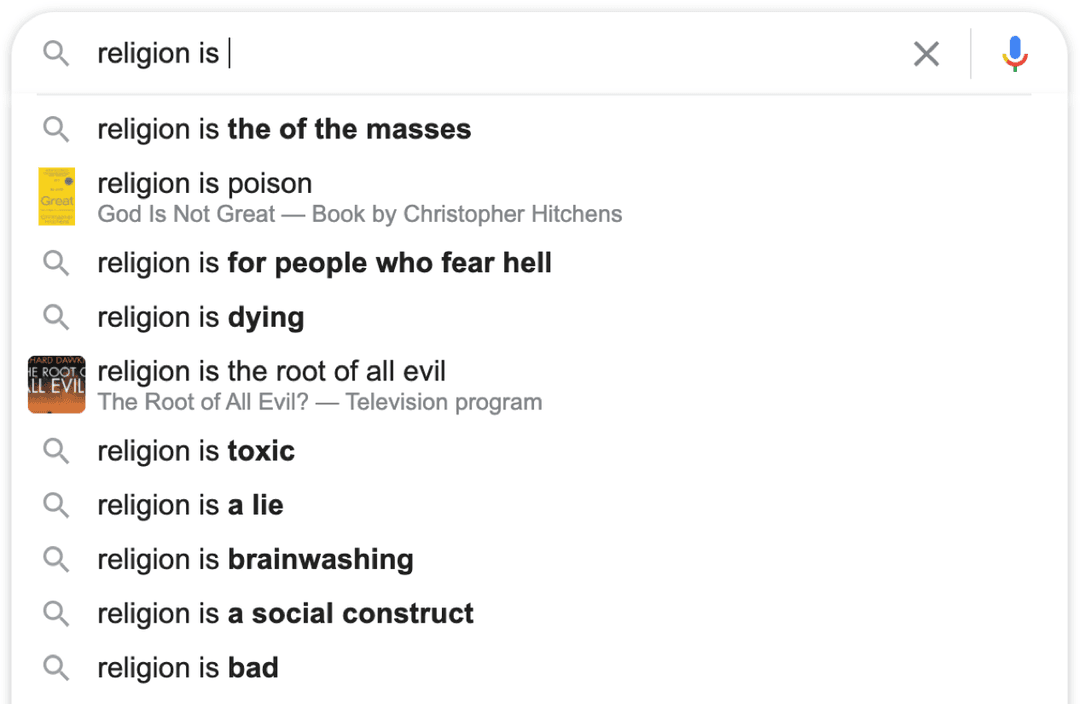 December 2020
December 2020For so much of human history we've clustered ourselves into religious groups, choosing the one that feels right to us. But like it or not, atheism is on the rise... and rightfully so. Whether you want to call it that, or agnosticism, it's safe to say that a lot of people are giving up on God. In fact, a Pew Research study found people unaffiliated with any religion has risen 9% since 2009. People are losing interest in the fables of holy books, and instead choosing to prioritize things like fighting climate change, balancing work and life demands, daily learning and growing, and equality and justice for all people. Not to mention, it seems like every other day we hear about another scandal in the religious community. The general public is finally coming to the truth. Many of us have discovered that we were mislead, but now we can begin to take real control over our lives, actions, and futures. We no longer have to live under the threat of going to heaven or hell. Nor do we have to spend out precious lives worshiping someone who has never presented even a shred of evidence for his existence. Albeit, atheism will only rise in popularity with the expansion of global internet and other technological advancements. Religion surely must fade away into a thing of the past; a time when we latched on to answers without sufficient evidence.
Listen to George Carlin explain the invisible man. He who threatens you with eternal torture and damnation! ...But he loves you.
Sure enough, another Pew Research Center study from 2014 confirmed that Americans are becoming less religious. Religious organizations, and their founders are just losing interest.
Back in 2007, more than 70% of Americans were confident that God exists. Let that sink in... Yet, by 2014 the number has plummeted nearly ten percent. But let's get real, these numbers are still absurdly high. We're talking about a majority of Americans confident in something that that nobody has ever been able to prove. Can you think of another thing in society that so many people believe to be true, irrespective of the lacking evidence? There have been thousands of discussions about the proof for the existence of God, and nobody has made a case that fundamentally differs from the requirement of faith based belief.
Nearly 1 in 10 Americans say they do not believe in God. In 2007 the number was half that. So things are trending in the right direction, but it needs to happen faster, exponentially faster.
But why do we believe? Are we on a path towards a more skeptical society?
Clearly we came about somehow, so it's logical to ask why we are here. For much of our history, people have dedicated their lives seeking to answer this question, and still no one has been able to definitively prove it. But we're hungry to know about the origins of the universe. We want to know what happens after death, and what happened in the beginning.
Religion attempts to provide some answers to our questions about life. It's not hard to guess an indiviual's religion based on where they were born and what socio-economic status they came from. For examlpe, if you happened to be raised in the Middle East, you're likely be a Muslim. If you were born in Brazil, your would likely be Roman Catholic. Ironically, each religious group is equally confident in their beliefs and the falsehood of the others. But these religions try to offer answers at the expense of science and analysis. The Quran famously states that Muhammad flew to heaven on a winged horse. Jesus was said to have walked on water, and risen from the dead. Claims as significant as extraordinary as these should require extraordinary evidence to support them. Yet no religions are able to truly prove their correctness. This is clearly demonstrated by the overall decline of organized religion in the Wester world.
Humans have been believing in gods for tens of thousands of years. We've created over 2,500 different gods, granted many of them share quite a lot things. Most people, at least in the United States, only believe in 1 of those gods. That would naturally imply feeling "atheist" in regards to at least 2,499 other gods. And an "atheist" simply feels that way about all 2,500+ of them..
Joshua Rhett Miller
Tara Isabella Burton
We are all atheists about most of the gods that humanity has ever believed in. Some of us just go one god further.
— Richard Dawkins, The God Delusion